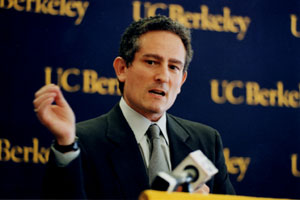|
HOME | SEARCH | ARCHIVE |
|
Neuroscientist wins March of Dimes Prize
![]()
By Robert Sanders, Public Affairs
| |  Professor Corey Goodman received a national award from the March of Dimes. Peg Skorpinski photo |
09 May 2001
|
Neuroscientist Corey Goodman, professor of molecular and cell biology and director of the Helen Wills Neuroscience Institute, has been named co-recipient of this year’s March of Dimes Prize in Developmental Biology. Goodman and co-winner Thomas Jessell, professor of biochemistry and molecular biophysics at Columbia University, received the award April 30, at a ceremony in Baltimore, Md. The two winners, both investigators in the Howard Hughes Medical Institute, have helped revolutionize the understanding of brain wiring and how it goes awry in birth defects and adult diseases. “These two imaginative scientists have helped to shape the present and future directions of an entire field of neural research,” said Jennifer Howse, president of the March of Dimes, whose mission is to improve the health of babies by preventing birth defects and infant mortality. “The result is that we now have opportunities to develop new types of gene-based drugs or other therapies for neural tube birth defects, such as spina bifida and anencephaly, and neurological disease such as Alzheimer’s, Parkinson’s and motor neuron diseases. This includes the possibility that, some day, patients with these disorders or with traumatic brain and spinal cord injuries may be treated by regrowing the right type of central nervous system cells and by coaxing their damaged cells into regrowing the right types of connections.” Goodman has used fruit flies to investigate how the growing tips of nerve cells find their proper targets and create the appropriate synapses with these cells. In the past 20 years, he has found numerous genes that control this growth, acting like traffic cops to steer growing axons toward or away from specific areas. He has shown, too, that the genes and mechanisms that control brain wiring are nearly identical in all animal species, including humans. Jessel has helped discover key genes involved in the signals that determine the identity of neurons and the specificity of the connections neurons make with their targets.
The prize is a cash award of $100,000, to be shared equally, and a silver medal in the design of the Roosevelt dime, in honor of former President Franklin Roosevelt, who founded the March of Dimes. The March of Dimes Prize in Developmental Biology is awarded annually to investigators whose research has profoundly advanced the science that underlies our understanding of birth defects.
Home | Search | Archive | About | Contact | More News
Copyright 2000, The Regents of the University of California.
Produced and maintained by the Office of Public Affairs at UC Berkeley.
Comments? E-mail berkeleyan@pa.urel.berkeley.edu.